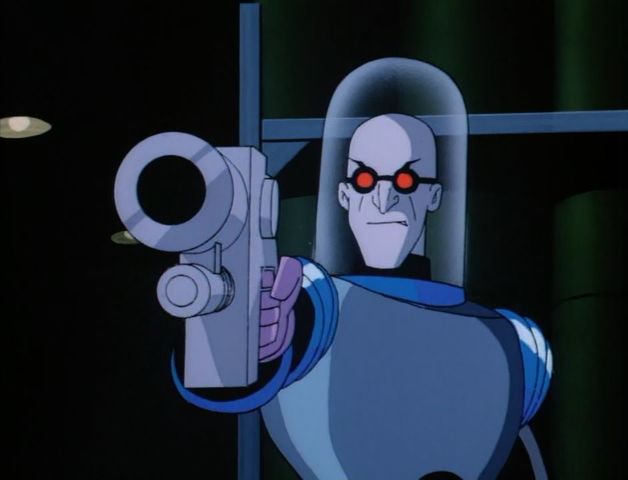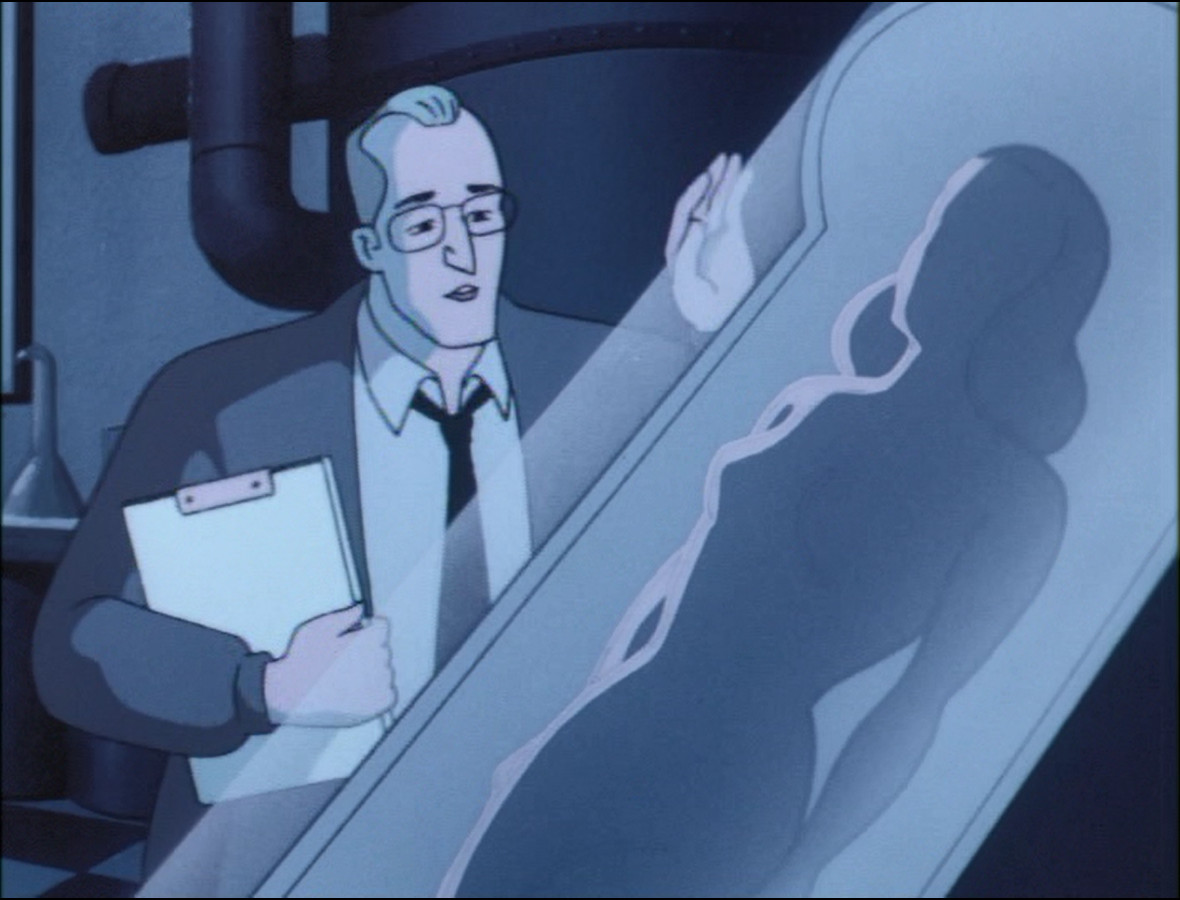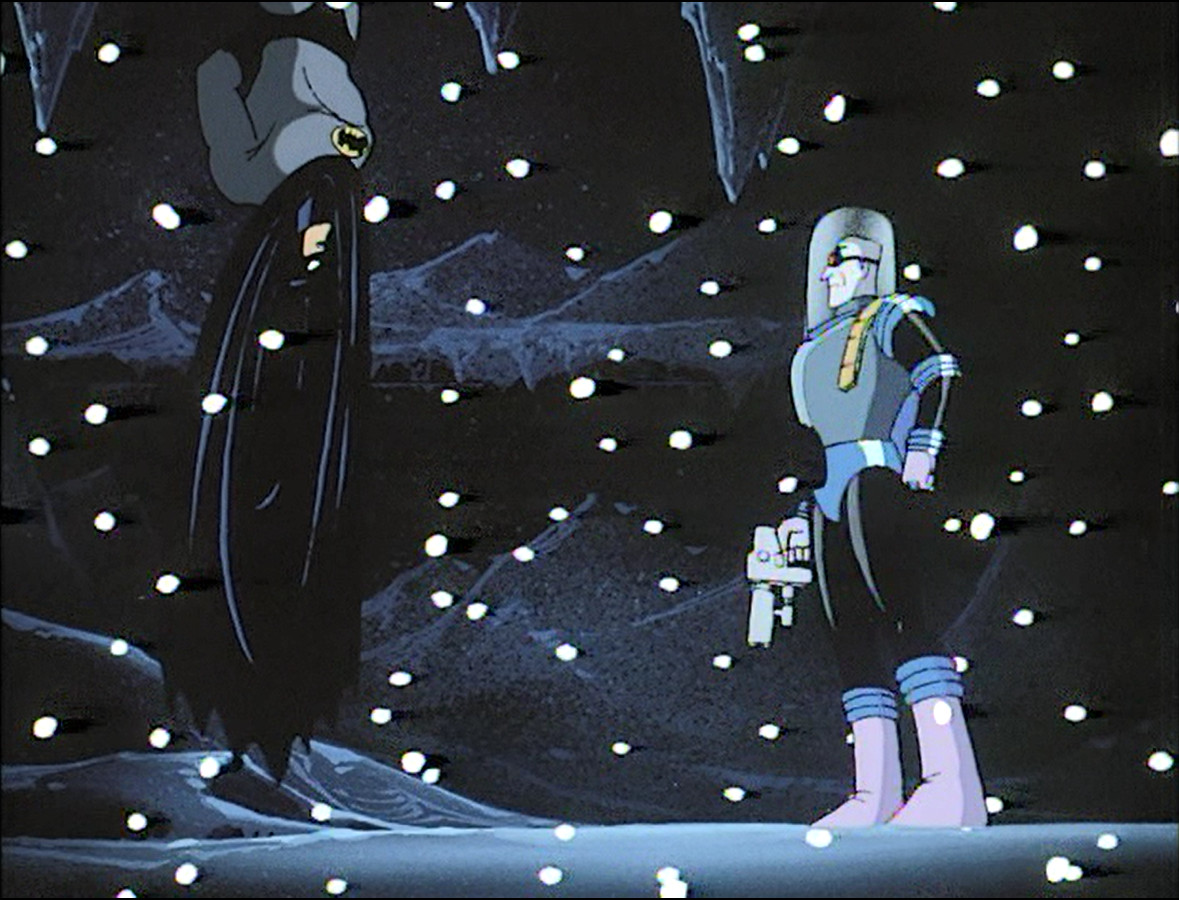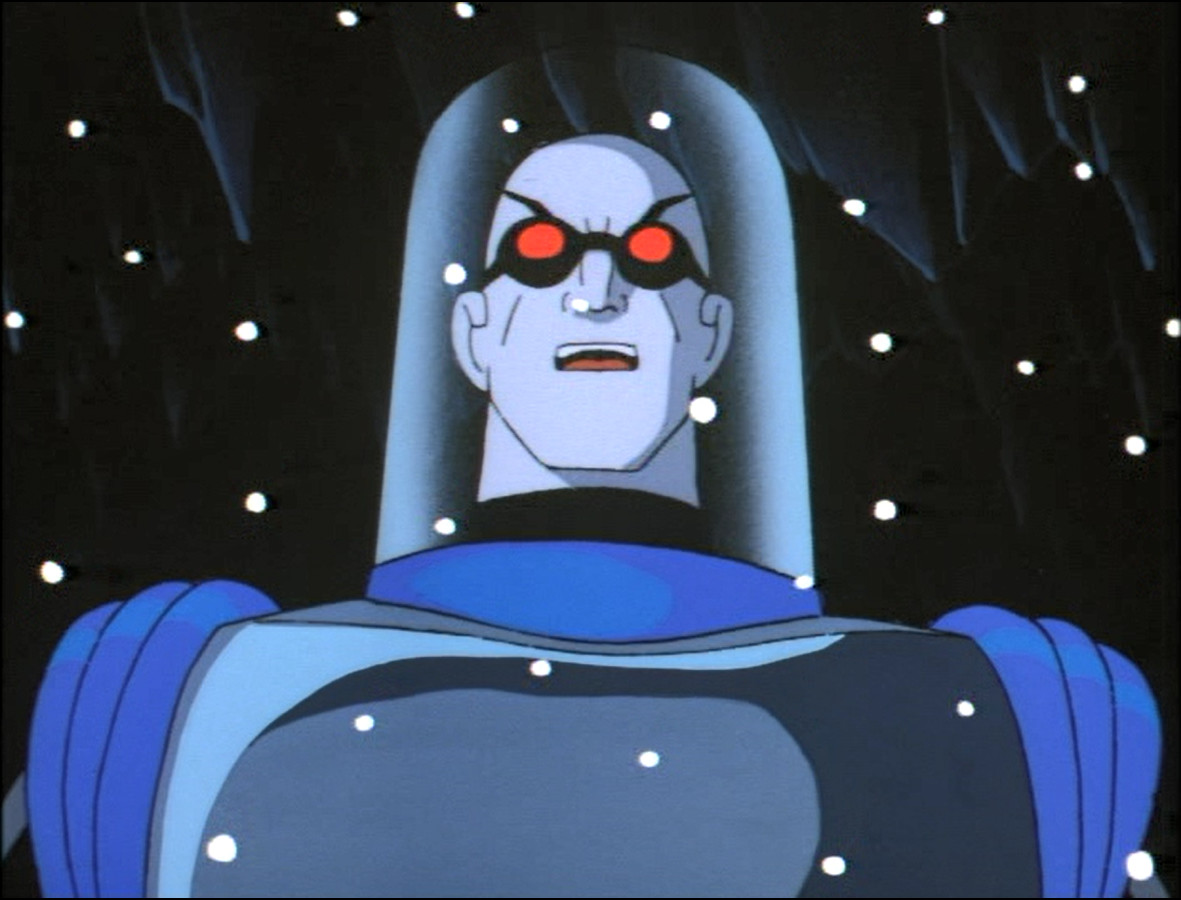Heart of Ice | BTASpectacular
Richard Petro / 18 September, 2017

- Airdate: September 7, 1992
- Director: Bruce Timm
- Writer: Paul Dini
A man dressed in strange armor speaks to a ballerina effigy in a glass dome, telling her he will take his revenge for taking her from him. Elsewhere, Summer Gleeson is giving a report about a series of attacks on GothCorp, ones committed by a “freeze gun” that generates ice. Ferris Boyle, the CEO, says he hopes to have it all cleared up soon. In the Batcave, Batman researches the stolen items, realizing that the end result will make a giant freeze gun, though it’s missing one more piece. Batman confronts the thieves at a GothCorp and meets the head of the group, the man in the armored suit calling himself Mr. Freeze. Freezing a thug of his own by accident whilst aiming for Batman, Freeze and his other thugs depart, as Batman stays behind to help the frozen man. Bruce, suffering from a cold, visits GothCorp and speaks to Boyle, who speaks of a scientist who died in a lab accident. Boyle says the employee was out of line and shows no remorse, and mentions he is receiving a humanitarian award as Bruce leaves. Batman poses as a guard to get in the GothCorp building and watches security footage of the accident; Victor Fries is working on a cure for his ill wife Nora, who he has put into a cryogenic state. Boyle bursts in with guards, and in a confrontation, chemicals fill in the room after Boyle knocks Fries into a table, and then Boyle and his men run off. Freeze appears behind Batman and blasts him with his gun. In his hideout, Freeze explains to a captured Batman that he must wear the suit to keep his body in a constant sub-zero environment so he does not die. He plans on having his revenge on Boyle, who effectively murdered his wife. Freeze departs and Batman frees himself. Freeze arrives at the Humanitarian party and attacks, freezing Boyle slowly. Batman is able to stop the cannon but is outmatched by Freeze in his suit, as it triples Freeze’s strength. Batman is able to crack Freeze’s helmet, paralyzing him. Freeze is shattered at the loss of his revenge, but Batman says justice will still prevail, handing Summer Gleason the tape of the accident and bids Boyle farewell, disgusted. Locked up, Freeze is speaking to the ballerina effigy, asking for Nora’s forgiveness for not being able to properly avenge her. From a rooftop across the way, Batman watches him before disappearing into the night.
 Two-Face was the first instance of the crew seemingly being able to present their ideas in an episode as they always hoped from the beginning. They, as seen, were able to have amazing success, producing one of the most important episodes in the series’ run. Now, two episodes later, they made something that not only had the same masterful class of storytelling as Two-Face, but one that resonated in ways that I don’t think even they could have foreseen.
Heart Of Ice took a character that was nothing more than a themed b-player (and b-level villain may even be gracious in some ways) and turned him into one of Batman’s most complex and tragic adversaries, in line with many of his other main rogues that are rooted in tragedy.
Two-Face was the first instance of the crew seemingly being able to present their ideas in an episode as they always hoped from the beginning. They, as seen, were able to have amazing success, producing one of the most important episodes in the series’ run. Now, two episodes later, they made something that not only had the same masterful class of storytelling as Two-Face, but one that resonated in ways that I don’t think even they could have foreseen.
Heart Of Ice took a character that was nothing more than a themed b-player (and b-level villain may even be gracious in some ways) and turned him into one of Batman’s most complex and tragic adversaries, in line with many of his other main rogues that are rooted in tragedy.
Mr. Freeze was now more than simply a villain with an ice theme. You aren’t even necessarily right in describing him as a villain. He is a man that has lost everything that he felt he had, turning to crime in order to exact revenge for something he felt was worth the awful that was done to him. In just 22-minutes, Victor Fries took his place as one of the most important and sympathetic characters in the Batman mythos. He was now akin to Two-Face, a perfect parallel to Bruce; someone who is an example of how different things have gone. But, most importantly and like all great villains, he is still very much his own person. I’ve always loved the fact that Freeze was never made to really interact or be part of the circle of villains. I love episodes that involve villains interacting and knowing each other (as we’ll see in an upcoming, obvious episode), it’s not who Mr. Freeze is. Crime isn’t his life. If he could have died when Nora did, it would have been fine by him, and even welcome. To live without her is his real burden, and it was never written in a way that would be overbearing. This is not over-the-top and thus more easily believable. Victor Fries is long dead, the fact that he is still here is mainly a curse to him that turns into a blessing/opportunity of revenge.
 There’s a moment that perfectly encapsulates what Mr. Freeze is, as he tells Batman that his vendetta is personal and does not involve him, instead opting to let the Caped Crusader go.
There’s a moment that perfectly encapsulates what Mr. Freeze is, as he tells Batman that his vendetta is personal and does not involve him, instead opting to let the Caped Crusader go.
There are a ton of great moments packed into the runtime here, from character moments to the usual fantastic direction. Bruce’s negativity towards Boyle and his ‘humanitarianism’ is great, from using his sickness to cover the fact that he very loudly states his disgust with the man to Batman leaving him on the line meant to sting. Batman has his own share of great character moments besides these, mainly the moment where he decides against following an escaping Freeze to save the freezing henchman. Speaking of the freezing henchman, I have always loved the moment given to the other henchmen Mr. Freeze has, where they vocalize their worry about their partner and the following guilty walk back to the vehicle past him on the ground. It’s a small but, but one that easily establishes them as their own people with feelings and dimension.
 There is a lot to write about Heart of Ice, and Lord knows I can. There have been so many words of praise dedicated to its greatness and importance and it deserves every single word of it, with awards and constantly voted as the greatest episode of the series. It’s a beautiful reinvention of a character, where he is given pathos, humanity, and a slew of fantastic lines that stand as some of the most effective and memorable from the show. I said I could write more, but this is an example of an episode where one must watch and experience it themselves. It’s a touching drama that, in many ways, can be considered a greater success than Two-Face. It’s an essential half-hour not just for the series, but for television.
There is a lot to write about Heart of Ice, and Lord knows I can. There have been so many words of praise dedicated to its greatness and importance and it deserves every single word of it, with awards and constantly voted as the greatest episode of the series. It’s a beautiful reinvention of a character, where he is given pathos, humanity, and a slew of fantastic lines that stand as some of the most effective and memorable from the show. I said I could write more, but this is an example of an episode where one must watch and experience it themselves. It’s a touching drama that, in many ways, can be considered a greater success than Two-Face. It’s an essential half-hour not just for the series, but for television.


